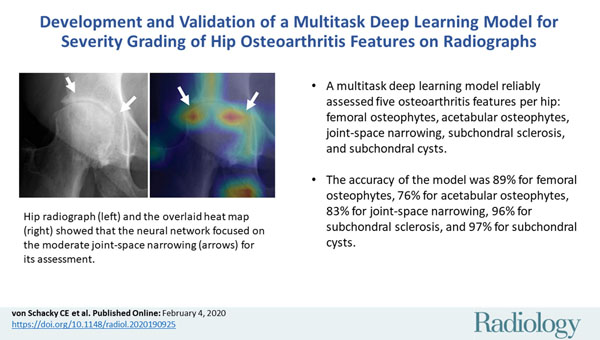A New Deep Learning Approach for Image Analysis of Osteoarthritis

Hip osteoarthritis can be a painful and debilitating condition. Unfortunately, osteoarthritis is a degenerative disease with no cure, as of yet. A long term research goal of the Musculoskeletal Quantitative Imaging Research (MQIR) interdisciplinary group in the UC San Francisco Department of Radiology and Biomedical Imaging, led by Sharmila Majumdar, PhD (director), and Thomas Link, MD, PhD (clinical director), is to develop advanced imaging techniques to detect early degenerative changes within the joint. Within MQIR, there is a focus on quantitative musculoskeletal image processing and artificial intelligence applied to the musculoskeletal system. This includes research surrounding the development of new clinically applicable machine learning and deep learning approaches for image analysis of osteoarthritis.
Overall, MQIR forms a cohesive center for faculty members, postdoctoral fellows, research staff, and medical and graduate students to pursue teaching and research in quantitative tissue characterization focused on the musculoskeletal system. One such postdoctoral scholar, Claudio Von Schacky, MD, was first author on a study recently published in Radiology.
The purpose of the study was to develop a multitask, deep learning model for grading hip osteoarthritis features on radiographs and compare its performance to that of attending-level radiologists. This retrospective study analyzed hip joints on weight-bearing anterior-posterior pelvic radiographs from participants in the Osteoarthritis Initiative (OAI). Participants were recruited from February 2004 - May 2006 for baseline measurements, and follow-up was performed 48 months later. A total of 4368 participants (2538 women and 1830 men) with a mean age of 61 years were evaluated. Researchers concluded that a multitask deep learning model is a feasible approach to reliably assess radiographic features of hip osteoarthritis.
During his time as a postdoctoral scholar at UCSF Radiology, Dr. Von Schacky worked closely with his sponsor and supervisor Dr. Link, chief of Musculoskeletal Imaging. Additionally, Valentina Pedoia, PhD and Jae Ho Sohn, MD, MS, supported Dr. Von Schacky as mentors and supervisors, and both contributed crucially in developing the deep learning models. Dr. Pedoia is an assistant professor in residence with a primary interest in developing machine learning algorithms for advanced computer vision and faculty of the Center for Intelligent Imaging (ci2). Dr. Sohn is a PGY resident and T32 scholar at UCSF leading the Big Data in Radiology (BDRAD) research group. Dr. Link also worked with Sarah Foreman, MD, another former postdoctoral scholar. Drs. Von Schacky and Foreman are currently at the Technical University of Munich.
Other authors from UCSF Radiology include Eugene Ozhinsky, PhD, research specialist and Magdalena Posadzy, post-doctoral radiology research scholar. Other authors from UCSF include Felix Liu and Michael Nevitt, PhD, MPH (Epidemiology and Biostatistics). Pia Jungmann, MD, former fellow now with the University of Freiburg and Lorenzo Nardo, MD, PhD from UC Davis Health were also authors.
